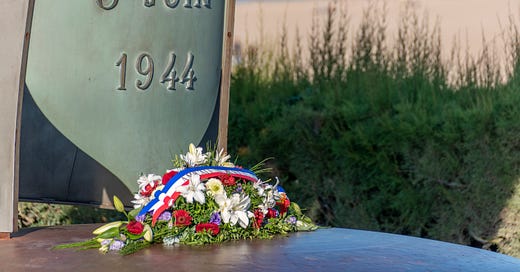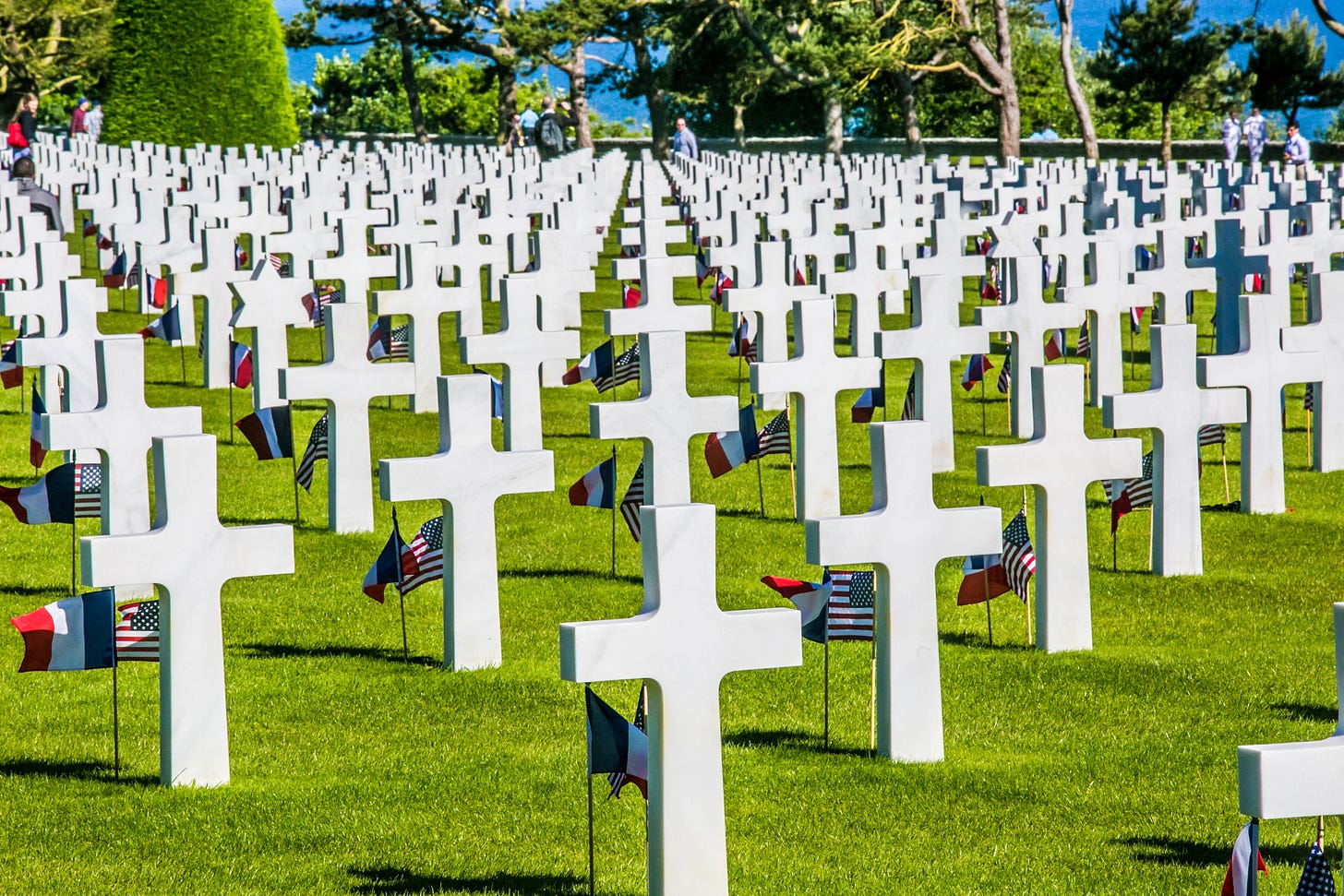One War, remembered differently
80 years since D-Day, momories of WW2 are more relevant than ever
Hello all, and welcome to the new subscribers who have found this newsletter through my work around being second-language English. Many of you listened to my interview on Luke’s English Podcast, which I confess I didn’t know before appearing on it, but that I’m quickly realising has more than 1 million loyal subscribers around the world. It was a great opportunity to properly nerd out about language so, if you’re also that way inclined, you can hear me bang on about how the world is divided along the lines of the rhotic R by clicking here . You can find the rest of the technical stuff related to my online course/coaching for second-language English speakers on www.barbaraserra.info .
On the other hand, this substack newsletter is where I focus on the CULTURAL differences between native and non-native English speakers, and the impact they have on the narrative in so-called international news.
Which brings me neatly to this post.
I started writing this newsletter while watching the 80th anniversary commemoration ceremony of the D-Day landings playing out in wall-to-wall coverage on British TV. The original D-Day was June 6th, 1944, the date of the Allied invasion of Normandy which at the time was occupied by the Nazis. It’s seen as a pivotal moment in WW2. Around 156,000 Allied soldiers, mainly American, British and Canadian, landed on French beaches that day. Around 4000 of them were killed by German soldiers. By the end of the summer, the whole of Northern France had been liberated. D-Day is often described as the ‘beginning of the end’ of the WW2.

In the UK, the memory of WW2 is a key element of the national psyche. It goes beyond patriotism. Britons are genuinely (and rightly) proud of their role in defeating Nazism, and the veterans and fallen of D-Day are honoured and remembered for their courage and sacrifice. Anyone with half an eye on the UK election will know that Rishi Sunak leaving the ceremony of commemoration early for a TV interview back in the UK is borderline catastrophic for his standing with older generations, precisely the ones the Conservatives have been targeting over the past few weeks.
Speaking of elections, while Britons have a few more weeks before heading to polls, today, Sunday June 9th, is election day for the EU. Hundreds of millions of people across the Union will vote for the European Parliament, the only of the EU institutions to be directly elected by European citizens themselves.
And that’s why, as I was watching the D-Day commemorations on TV, I also saw a video by the European Parliament pop up on my social media feeds. It’s a campaign video to convince people to vote in an election that has a traditionally very low turnout right across the Union. Like the D-Day commemoration, the video is also about remembering World War 2. But its focus is very different.
Long-time readers of this newsletter will know I’ve made a film about my own family’s fascist history, Fascism in the Family, which I’m currently turning into a book, and that I’ve done a lot of research into my grandfather’s role within Mussolini’s regime, and fascism in general. As a continental European who’s called the UK home for 30 years, I’m always struck by how different the views of that war are on either side of the English Channel. The EU election video (embedded below), where the last generation of Europeans who witnessed the horror of WW2 speak to their grandchildren, reminded me of that.
Invasion. Occupation. Public executions. Deportations. Concentration camps. Collaboration. The loss of democracy. Mass rapes. Those are the horrific aspects of war that continental European civilians lived through and that Britons and Americans, the key countries in the Alliance that defeated Nazism, were mercifully spared.
It means that WW2 has left different scars.
Unlike Americans, British civilians withstood the relentless bombardments of the Luftwaffe during the Blitz, which devastated London and other strategic parts of the UK. Their resilience in the face of sustained attacks is to be admired. But a bombing campaign is not the same as being invaded and occupied, which mainland Britain wasn’t. In turn that means collaboration with the occupying force never happened. The civilian population of Britain was spared the most extreme horrors of war in a way that the civilian populations of continental Europe weren’t.
I know it’s an imperfect comparison, but watching both the D-Day commemoration and the EU election video back to back reminded me of those different scars. Americans and Britons look back on WW2 with respect, deference and pride. As they should. They were on the right side of history. They never had to look at themselves in the mirror at the end of the war and wonder how on earth brutal ideologies like Nazism and Fascism could take hold. They never had to heal the wounds of collaborators working with the enemy, of having allowed their neighbours to be deported to certain death.
This matters. As the saying goes, you learn more from failure than success. And though I’d hardly claim that continental Europeans have developed the antibodies for the causes of war, I do find their collective remembrance to be more complex and more nuanced. Ultimately, I’ve found I’ve learnt more valuable lessons from it.
There is a language aspect to this too, as it is the anglophone countries who, by virtue of English being the global language, have a disproportionate influnce on what we could call ‘international journalism’. Their cultural experience of the war dominates in countless films and books. Even the stories of continental Europeans during the war are more often than not told through the anglophone lens.
This subject is more topical than we might wish. We’ll find out what the election results of the European Parliament are soon enough, but it’s widely expected that there will be a resurgence of the radical Right.
Again, ‘right-wing’ means different things depending on the context. The Conservatives are the party of Winston Churchill, who defeated fascism. Giorgia Meloni’s Brothers of Italy have their roots in neo-fascism. Neither one espouse anything like the right-wing ideology that took hold a century ago, but their different histories shouldn’t be ignored when looking at their present policies.
It is clichè to say we live in difficult and potentially dangerous times, though we do. This article by Patrick Wintour, Diplomatic Editor of the Guardian on the forgotten lessons from history is an important and detailed read on the current political situation Europe is facing. Are we like 1938, a time when WW2 might have been avoided? Or are we inching closer to 1939, the point of no return for a conflict that claimed the life of 75 million people?
The lessons of history to be learnt are different depending on the history a country has lived through. For the Allies it’s the dangers of appeasement. For countries like Italy and Germany, it’s the rise of authoritarianism.
But for all, one question seems key now - how ready is Europe and the wider West for war, not just militarily but culturally? 80 years after D-Day, on either side of the English Channel and Atlantic, it’s a question that’s more pertinent now than it has been for decades.





Really enjoyed the interview on Luke’s English Podcast (in case anyone reading this gets confused, I am a different Luke!).
It’s interesting you mentioned how British accents are more accepted in American news than vice versa. I tend to think that rightly or wrongly, British accents have a certain authority and cachet that American accents don’t. Why this is, I don’t know - I imagine it’s, at least in part, a hangover from the days of colonialism. But this is just my half baked theory - nothing more!
Oddly enough, I was fascinated at how so many of the presenters at CNN International are Australian. Apparently there is a very good reason for this: the Australian accent is easiest to understand for non-native English speakers. Food for thought…
Thanks for this very important piece. I have also to say that we also need to define what Europe means. Often, we overlook the experience of Central-Eastern Europe where WWII was a brutal affair. Even more than in France or Belgium.